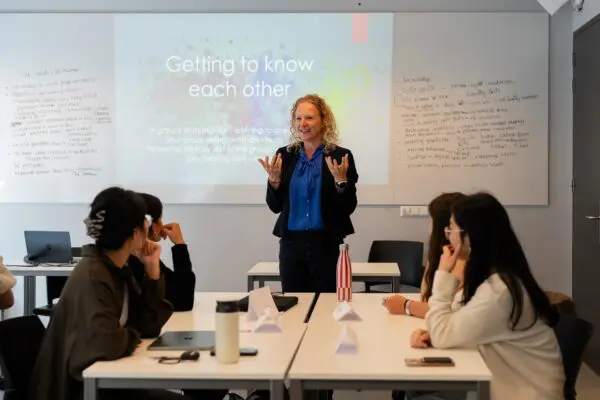
Amsterdam, Netherlands
Addressing Conflict: Peacebuilding in Theory and Praxis
When:
25 June - 15 July 2026
Credits:
6 EC
Read more
Social Sciences
When:
24 March - 28 March 2025
School:
Institution:
European Consortium for Political Research (ECPR)
City:
Country:
Language:
English
Credits:
4 EC
Fee:
492 (non-member fee) 985 (member fee) GBP

You will gain a practical understanding of the typical steps of an interpretive research process – from how to formulate an interpretive research question to how to present and document interpretive analyses.
Need to know
None, though basic knowledge of qualitative methodology and methods would be an advantage. The commitment time is approximately 45 hours, including readings and on-site participation.
Learning commitment
As a participant in this course, you will engage in a variety of learning activities designed to deepen your understanding and mastery of the subject matter. While the cornerstone of your learning experience will be the daily live teaching sessions, which total three hours each day across the five days of the course, your learning commitment extends beyond these sessions.
Upon payment and registration for the course, you will gain access to our Learning Management System (LMS) approximately two weeks before the course start date. Here, you will have access to course materials such as pre-course readings. The time commitment required to familiarise yourself with the content and complete any pre-course tasks is estimated to be approximately 20 hours per week leading up to the start date.
During the course week, you are expected to dedicate approximately two-three hours per day to prepare and work on assignments.
Each course offers the opportunity to be awarded three ECTS credits. Should you wish to earn a 4th credit, you will need to complete a post-course assignment, which will involve approximately 25 hours of work.
This comprehensive approach ensures that you not only attend the live sessions but also engage deeply with the course material, participate actively, and complete assessments to solidify your learning.
In depth
The course covers different interpretive methods. You will learn to ‘read’ texts while becoming familiar with contemporary thinking about interpretation, narrative, and discourse.
The course focuses on narrative method, hermeneutics, phenomenology, discourse analysis, deconstruction method and genealogy. Its six objectives are to:
1.Examine the scientific criteria of interpretive research to teach you the basics of formulating an interpretive research question
2.Introduce issues of conceptualisation, theory, research design, and strategies of framing questions and selecting cases
3.Help you organise and process material through interpretive coding strategies
4.Teach you how to choose the best interpretation strategy for your research question
5.Explain how to condense and present interpretations
6.Draw conclusions from interpretive analyses.
Monday: Introducing interpretive methods
1.Welcome
2.Interpretation of what? Asking the ‘right’ question of the ‘right’ material
3.Selecting and collecting data suited to interpretation
4.Introduction of written assignment
5.Group exercise
Tuesday: Interpretive strategies, positions and methods I - Hands-on strategies for interpretation and analysis
1.Narrative methods
2.What’s your unit of analysis? Organising your data
3.What’s in your data? Reading your data
4.Group exercise on narrative, interpretive research strategies
Wednesday: Interpretive strategies, positions and methods II - Hands-on strategies for interpretation and analysis
1.Narrative methods
2.What’s your unit of analysis? Organising your data
3.What’s in your data? Reading your data
4.Group exercise on narrative, interpretive research strategies
Thursday: Interpretive strategies, positions and methods III - Hands-on strategies for interpretation and analysis
1.Discourse analysis
2.How to make sense of it?
3.Sorting your data using interpretive research strategies
4.Group exercise on contextualised, interpretive research strategies
Friday: Condensing and presenting interpretations - Drawing conclusions from interpretive analyses
1.Presentation of interpretive analyses
2.You only know what you (can) show – citations and displays
3.Scientific criteria
4.Documentation
5.Publication
6.Group exercise on conclusion-drawing and presentation of interpretive analysis
How the course will work online
The course includes pre- and post-class activities, along with in-class presentations.
Before the course, reading material and pre-recorded lectures will be available on the learning management system for you to access at your own pace. Send your topic-related questions in advance to the Instructor.
In-class activities include short lectures, peer feedback, group exercises and presentations.
After the course, you can create presentations supported by Instructor feedback on your projects.
The instructor will conduct live Q&A sessions and offer designated office hours for one-to-one consultations.
Marie Østergaard Møller is Associate Professor at Aalborg University in Denmark.Her research interests include social and political categories, categorisation, frontline work, welfare state research and classic social theory of solidarity.
This course is designed for those working at masters level and above. It has been capped at a maximum of 16 participants, allowing the Instructor to cater to the specific needs of each individual.
You will gain a practical understanding of the typical steps of an interpretive research process – from how to formulate an Interpretive research question to how to present and document interpretive analyses.
The course introduces a broad spectrum of interpretive approaches, including narrative methods, discourse analysis, and deconstructive analytics. By understanding their logics and uses, you will be able to select a strategy that fits your own research question.
If you're interested in this course, registration opens on 01/10/24 and you can register here: https://ecpr.eu/Events/Event/PanelDetails/15625
Fee
492 (non-member fee) 985 (member fee) GBP, ECPR Member - check if your institution is a member on our website.
Fee
985 GBP, ECPR Non-Member
When:
24 March - 28 March 2025
School:
Institution:
European Consortium for Political Research (ECPR)
Language:
English
Credits:
4 EC

Amsterdam, Netherlands
When:
25 June - 15 July 2026
Credits:
6 EC
Read more

Lugano, Switzerland
When:
10 August - 14 August 2026
Credits:
0 EC
Read more

Barcelona, Spain
When:
06 July - 10 July 2026
Credits:
0 EC
Read more